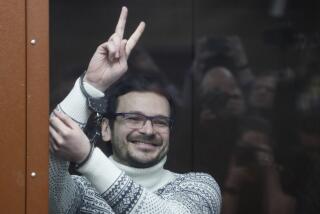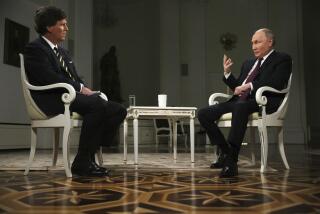Russia Wants Solzhenitsyn Back in Fold : Reform: Yeltsin voices contrition for Kremlin treatment of the Nobel-winning author.
- Share via
WASHINGTON — In one of his first acts after landing in America on Monday, Russian President Boris N. Yeltsin phoned Alexander I. Solzhenitsyn to voice contrition for past Kremlin persecution and to assure the Nobel literature laureate that “Russia’s doors are wide open” for his return, Yeltsin’s spokesman said.
“In the words of the president, one could feel undertones of repentance,” Vyacheslav V. Kostikov told reporters at the Russian Embassy after the 30-minute phone call between Russia’s president and its greatest living writer, in exile since 1974.
“He (Yeltsin) understands that the authorities caused great moral damage to Solzhenitsyn . . . a great writer,” Kostikov said.
Solzhenitsyn, the author of the monumental “Gulag Archipelago,” a stunning chronicle of political repression in the prisons and labor camps of the Soviet Union, was accused of treason and banished from the Soviet Union four years after he won the Nobel Prize. He lives now in Cavendish, Vt.
Last month, Solzhenitsyn’s wife, Natalia, flew to Moscow with the couple’s three sons to prepare for the author’s return to the non-Soviet, non-Communist Russia he had so long advocated. This month, Moscow authorities also decided to return the novelist’s apartment to him.
Solzhenitsyn, whose prestige among his people is enormous, incarnates a more traditionalist strain in Russian thought than the bulk of the Westernized democrats and free-marketeers who now surround Yeltsin.
His public backing would have immense political value at a time when Yeltsin’s right-wing opponents are loudly accusing the president of selling Mother Russia out to the International Monetary Fund and the West in general.
It was therefore with visible satisfaction that Kostikov announced that during the call to Solzhenitsyn, which Yeltsin had promised to make after arriving in Washington for the U.S.-Russian summit, the writer hailed Yeltsin’s visit and “earnestly supported the reforms and the policy of the president.”
According to Kostikov, Solzhenitsyn singled out for special praise Yeltsin’s intentions to legalize the private ownership of land and to allow Russia’s long-suffering peasantry, the social group Solzhenitsyn views as the No. 1 victim of the Bolshevik experiment, to become the masters of the plots they till.
Despite the dramatic changes that have occurred in Russia recently, Solzhenitsyn does not seem in a hurry to return to the country that has been the sole subject of his life’s work.
According to Solzhenitsyn’s U.S. publisher, the author of “One Day in the Life of Ivan Denisovich,” “The First Circle” and other works now prefers the computerized and more bountiful library resources of American institutions to the antiquated archives of Russia.
“He didn’t say whether he will take three more months or six more months,” Roger Straus, president of Farrar, Straus & Giroux in New York, said by telephone earlier Monday when asked when the writer might return to Russia.
Solzhenitsyn, who generally shuns contacts with the press, could not be reached Monday night to get his version of the talk with Yeltsin.
Whatever the relative ease of working in the United States, Yeltsin’s spokesman said Solzhenitsyn’s rightful place was now in his native land.
“The doors of Russia are wide open for Solzhenitsyn,” Kostikov said. “Russia is ready at any moment to receive Solzhenitsyn and do everything possible so that he can continue his work for the good of the country, not in America, not in alienation--even if it is hospitable--but on his native soil.”
More to Read
Sign up for Essential California
The most important California stories and recommendations in your inbox every morning.
You may occasionally receive promotional content from the Los Angeles Times.













